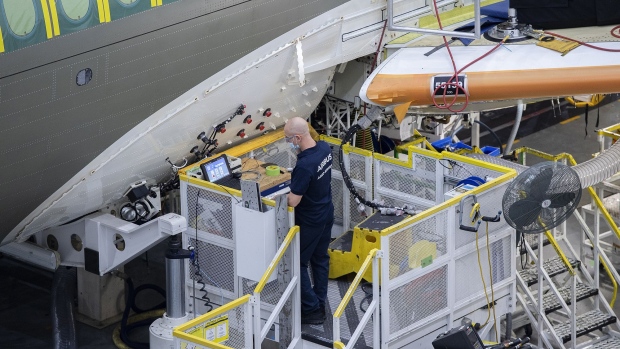Oct 28, 2022
Airbus Maintains Delivery Target, Raises Cash-Flow Outlook
, Bloomberg News

(Bloomberg) -- Airbus SE maintained its year-end delivery target for aircraft, while cautioning that production disruptions could last into next year amid persistent shortage in labor and raw materials at suppliers.
The planemaker said it still strives to hand over 700 aircraft this year, and the company is working toward boosting output of its bestselling A320 family to 75 by 2025. Airbus is also studying higher output of its wide-body aircraft in anticipation of rising demand for that category toward the end of the decade, Chief Executive Officer Guillaume Faury said.
“We are operating in a very degraded environment,” Faury said on a call with journalists. “We have problems a bit all around the place, we have lots of parts arriving late, production efficiency is low.”
Clinging to the goal will mean Airbus must ship an average of 88 planes a month for the remainder of the year, though output typically accelerates in the final few months, a phenomenon that Faury also predicted for next year.
Airbus fell as much as 3.3 euros, or 3.5%, to 102.62 euros in Paris trading. The stock has lost 7.2% in value this year.
While Airbus struggles with supply constraints, the dollar is providing a welcome boost because aircraft are purchased in the US currency. That allowed the planemaker to lift its year-end target for free cash flow to €4.5 billion from €3.5 billion as it converts so-called pre-delivery payments into the European currency.
Airbus reported third-quarter adjusted earnings before interest and tax of €836 million compared with €666 million a year earlier, missing analyst estimates for a profit of €920.5 million, based on data compiled by Bloomberg. Sales advanced 27% to 13.31 billion euros.
Airbus said that all three test aircraft of its long-range A321XLRs have now flown, and that entry-into-service is slated for the second quarter of 2024. The company is also exploring the possibility of ramping up wide-body output, with the current build rate of the A330neo at three units a month and the A350 model going to six next year. By year-end, monthly output of the A320 will reach about 50 units, Faury said.
Demand for flying has soared as countries ease pandemic-era restrictions, prompting airlines to order planes to grow their networks with more fuel-efficient models. Deutsche Lufthansa AG and Air France-KLM both said this week that the winter schedule will remain robust as people keep booking despite a more acute cost-of-living squeeze.
Airbus also maintained its targets to achieve about €5.5 billion in adjusted earnings before interest and tax for the year. The upbeat outlook contrasts with arch-rival Boeing Co., which this week pared its annual forecast for deliveries of its 737 narrowbody jets, saying it now expects to hand over 375 of the jetliners this year. The US planemaker had previously targeted deliveries of close to 500 before lowering the goal in July to the “low 400s.”
(Updates with share price reaction in fifth paragraph.)
©2022 Bloomberg L.P.


